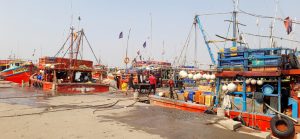Marine fishing ban comes into force; thousands face job loss

Balasore/Paradip: A two-month-long ban on marine fishing along Odisha’s coastline is all set to take effect Tuesday, forcing thousands of fishermen to dock their boats and brace for financial hardship.
Enforced annually under the Odisha Marine Fishing Regulation Act, 1982, the ban, in place from April 15 to June 14, aims to protect breeding marine species during the critical spawning season.
The restriction, issued by the Directorate of Fisheries (Notice No 4038, dated April 11), applies to all mechanised fishing operations across the state’s coastal harbours and is intended to help replenish dwindling fish stocks and support long-term marine biodiversity.
However, the ban triggers a widespread livelihood crisis among the fishing community. An estimated 50,000 families, including fishermen, boat owners, trawler operators, ice factory workers, and labourers, rely on marine fishing for daily income. With operations set to halt in key hubs such as Paradip, Balaramgadi, Chandipur, Bahabalpur, Talasari, and Gopalpur, communities will have to grapple with unemployment and economic uncertainty.
At Paradip, Odisha’s largest fishing harbour, about 90 per cent of vessels had returned to port by Sunday evening, with the remainder docking by Monday. Fishing activity along the coast from Chaumukh to the Hanskara river mouth has come to a standstill. “Most boats have been pulled ashore. There’s no work for us until the ban ends,” said Suba Rao, a fisherman from Paradip.
“Many from the Nolia community have already migrated back to Andhra Pradesh,” he added. With all fishing boats and dinghies docked, a sense of stillness has descended upon the coastal region. While the state government has announced relief measures, including the distribution of rice and essentials to affected families, many fishermen say they have yet to receive support.
A major hurdle is the lack of registration — only traditional fishermen officially recognised by the Fisheries department are eligible for benefits. “This is the toughest time of the year for us,” said a fisherman from Baliapal in Balasore district.
“We have no income, and our families are suffering. We urge the government to step in with immediate aid.” Beyond just the fishermen, the impact ripples across the fishing economy, from transporters and fish sellers to seasonal labourers working in ice plants and processing units. Adding to the pressure, the ban is expected to result in a shortage of marine fish in local markets, driving up prices and affecting consumers statewide.
Fishermen’s unions and local leaders have called for urgent intervention by the state to provide financial relief and ensure food security during the ban. Without meaningful support, many warn, the coastal fishing community could face worsening hardship.
PNN
News